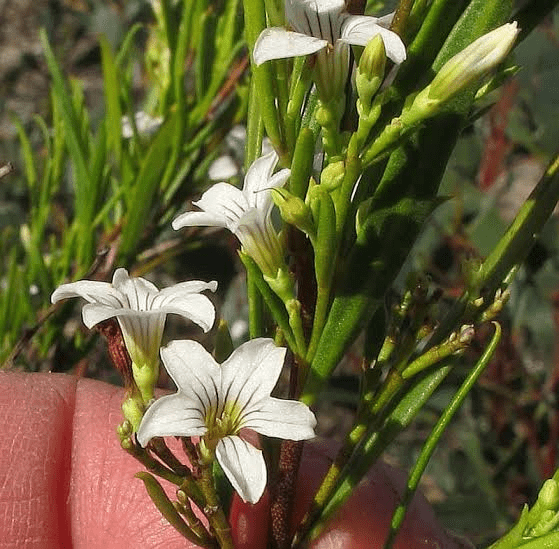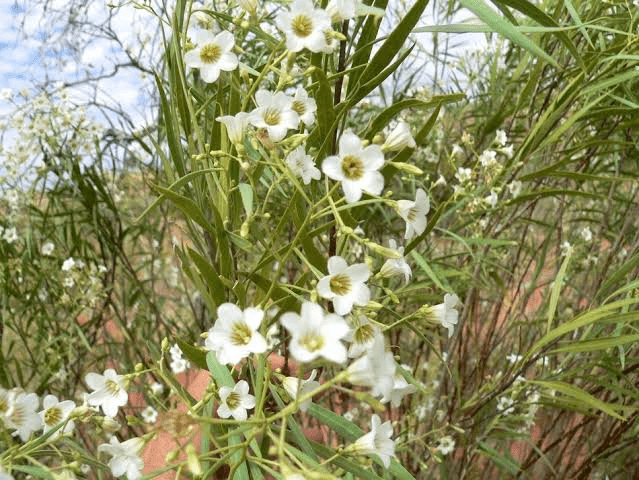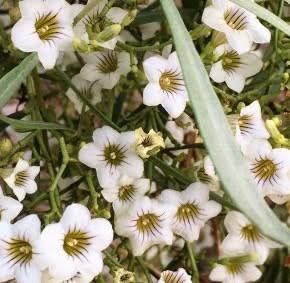Pituri (Duboisia hopwoodii) is a small, wispy shrub native to the arid interior region of Australia. It typically grows to between 1 and 3 meters in height and has long, narrow leaves.
The flowers are white and bell-shaped with violet-striped throats, and appear between June and November in the species’ native range. Pituri produces purple-black, rounded berries which are 3 to 6 mm in diameter.
Like other members of the Solanaceae family such as tobacco, D. hopwoodii contains nicotine. However, it also contains other alkaloids, including nornicotine and hyoscyamine, which give it its unique effects.
Pituri has been used by Aboriginal Australians for centuries as a stimulant and relaxant. It is typically chewed as a quid, with the ash of various plants added to enhance the effects. Pituri can produce a range of effects, including increased alertness, euphoria, and relaxation. It can also cause drowsiness, nausea, and vomiting at high doses.
Pituri is a powerful drug and should be used with caution. It is important to start with a small amount and increase gradually to avoid adverse effects. Pituri should not be used by pregnant women, people with heart problems, or people with a history of mental illness.
Pituri is an important cultural plant for Aboriginal Australians. It is used in ceremonies and rituals, and is also used for medicinal purposes. However, it is important to note that Pituri is a powerful drug and should be used with caution.
The Botanical Description of Pituri
1. Characteristics of Pituri: Pituri, scientifically known as Duboisia hopwoodii, is a unique plant native to Australia, belonging to the Solanaceae family. It’s an evergreen shrub with glossy, dark green leaves, small, fragrant, bell-shaped flowers, and a height of 3-5 meters.
2. Leaves and Flowers: The leaves are elliptical, smooth, leathery, and arranged alternately along the stems. Pituri’s pale yellow flowers bloom in clusters, adding to its aesthetic appeal and contributing to its reproductive cycle.
3. Roots and Stem: Pituri’s roots are extensive, anchoring it firmly in the soil. The stem is woody and sturdy, providing structural support and enabling the plant to withstand various environmental conditions.
The Geographic Distribution of Pituri
1. Native Habitat: Pituri is primarily found in arid and semi-arid regions of Australia. It thrives in well-drained soils, often growing in sandy or gravelly substrates. This plant is commonly found in the northern and central parts of Australia, well-adapted to harsh conditions.
2. Ecological Importance: In its native habitat, Pituri provides shelter and food for insects and birds, contributing to biodiversity. Its leaves and flowers enrich the soil as they decompose, emphasizing its ecological significance.
3. Cultivation Beyond Native Regions: Pituri’s unique properties have led to cultivation in controlled environments in other parts of the world, aiding research and ensuring a sustainable supply for various purposes.
The Chemical Composition of Pituri
1. Alkaloids: Pituri contains significant alkaloids, mainly nicotine and nornicotine. These alkaloids act as natural insecticides, with higher concentrations in leaves and stems compared to the roots.
2. Secondary Metabolites: Pituri also contains secondary metabolites like flavonoids, terpenoids, and phenolic compounds. These play a role in the plant’s defense mechanisms, protecting it from stressors and pathogens.
3. Medicinal and Cultural Significance: The alkaloids in Pituri have stimulant effects, traditionally used by Indigenous Australians for medicinal and ceremonial purposes. Modern research explores its pharmacological properties for potential medicinal and therapeutic applications.
Read Also: Pasture Harvesting and Processing Methods
The Medicinal Health Benefits Of Pituri (Duboisia hopwoodii)

1. Anti-Inflammatory Properties: Pituri contains compounds that have anti-inflammatory effects, potentially aiding in the management of inflammatory conditions such as arthritis and joint pain.
2. Analgesic Effects: The plant’s alkaloids possess analgesic properties, offering relief from pain. This makes Pituri valuable in traditional medicine for alleviating various types of pain.
3. Respiratory Health: Pituri has been traditionally used to address respiratory issues like coughs and congestion. It may help in clearing the respiratory passages and easing breathing difficulties.
4. Stimulant Properties: Pituri’s alkaloids act as natural stimulants, providing a boost of energy. This stimulant effect can help combat fatigue and increase alertness.
5. Digestive Aid: Pituri has been used to soothe digestive problems such as indigestion and mild stomach discomfort. It may help in promoting better digestion.
6. Traditional Indigenous Medicine: Indigenous communities have utilized Pituri for generations, incorporating it into their traditional medicine practices for various health purposes.
7. Potential Cognitive Benefits: Some studies suggest that Pituri might have cognitive-enhancing properties, potentially aiding in memory and mental clarity.
8. Antiemetic Properties: Pituri has been investigated for its ability to reduce nausea and vomiting, making it valuable for individuals experiencing these symptoms.
9. Respiratory Relaxant: It may act as a respiratory relaxant, making it useful for conditions like asthma where bronchodilation is necessary.
10. Anti-Anxiety Effects: Anecdotal evidence hints at Pituri’s mild anti-anxiety effects, which can contribute to relaxation and stress reduction.
11. Skin Care: In some traditional uses, Pituri has been applied topically for skin issues, offering relief from irritation and promoting skin health.
12. Nutritional Value: Pituri, with its alkaloids, holds nutritional significance in certain traditional diets, providing both sustenance and stimulant effects.
13. Antibacterial Properties: Preliminary research suggests that Pituri may have antibacterial properties, making it potentially effective against certain bacteria.
14. Potential Smoking Cessation Aid: Due to its nicotine content, Pituri has been explored as a component in smoking cessation programs, although more research is needed.
15. Traditional Chewing and Smoking: Indigenous communities traditionally chewed or smoked Pituri leaves, emphasizing its cultural and medicinal importance.
16. Pain Management: Pituri’s analgesic properties make it valuable for managing various types of pain, offering a natural alternative to conventional pain relievers.
17. Respiratory Support: Its traditional use for respiratory issues highlights its role in supporting respiratory health, making breathing easier for individuals with certain conditions.
The Methods of Usage to Achieve the Provided Health Benefits Of Pituri (Duboisia hopwoodii)
1. Chewing: One common method of Pituri consumption is by chewing its leaves. This allows the alkaloids to be absorbed through the mucous membranes in the mouth, providing a relatively rapid effect.
2. Smoking: Traditionally, Pituri leaves have been dried and smoked. Smoking allows for the inhalation of its beneficial compounds, providing both stimulant and potential respiratory benefits.
3. Brewing Tea: Pituri leaves can be brewed to make a tea. This method extracts the plant’s medicinal properties, allowing for oral consumption in a liquid form.
4. Poultices: For topical applications, Pituri leaves can be crushed and used as poultices. These poultices are applied directly to the skin, offering localized relief for skin irritations and insect bites.
5. Tinctures: Pituri tinctures involve steeping the plant in alcohol. Tinctures offer a concentrated form of Pituri, allowing for precise dosage control and ease of use.
The Side Effects Of Using Pituri Medicinal Plant
1. Nicotine Dependence: Pituri contains nicotine, which can lead to dependence if used excessively or for prolonged periods. Users should be aware of the addictive nature of nicotine.
2. Increased Heart Rate: Nicotine in Pituri can lead to an elevated heart rate, which may be problematic for individuals with heart conditions or hypertension.
3. Digestive Discomfort: Some individuals may experience mild digestive issues, such as nausea or indigestion, especially if Pituri is consumed in large quantities.
4. Skin Irritation: Topical use of Pituri may cause skin irritation or allergic reactions in sensitive individuals, necessitating a patch test before extensive use.
5. Central Nervous System Effects: Excessive consumption of Pituri can lead to symptoms such as dizziness, headaches, or even confusion due to its impact on the central nervous system.
6. Respiratory Distress: Inhaling smoke from Pituri may cause respiratory distress, particularly in individuals with pre-existing lung conditions, allergies, or sensitivities.
7. Interactions with Medications: Pituri’s alkaloids can interact with certain medications, affecting their effectiveness or leading to adverse reactions. It’s crucial to consult a healthcare professional if using Pituri alongside prescribed medications.
8. Cultural and Ethical Considerations: Due to its cultural significance, Pituri use should be approached with respect for indigenous traditions and ethics. Users should be culturally sensitive and aware of the plant’s importance in indigenous communities.**
Read Also: Pasture Management and Improvement
The Scientific Research and Studies of Pituri (Duboisia hopwoodii)

1. Alkaloid Analysis: Several studies have focused on the alkaloid composition of Pituri, particularly nicotine and nornicotine. Researchers have employed chromatographic techniques to quantify these alkaloids, providing valuable insights into the plant’s chemical composition.
2. Pharmacological Investigations: Scientific research has delved into the pharmacological properties of Pituri’s alkaloids. Studies have explored their effects on the nervous system, cardiovascular system, and potential applications in medicine.
3. Traditional Knowledge Integration: Researchers have collaborated with Indigenous communities, integrating traditional knowledge with scientific research. This collaborative approach has enhanced our understanding of Pituri’s cultural significance and medicinal properties.
4. Cultivation and Sustainable Harvesting: Scientific studies have explored the cultivation methods of Pituri, aiming for sustainable harvesting practices. This research contributes to conservation efforts and ensures a stable supply of the plant.
5. Potential Medical Applications: Ongoing studies are investigating Pituri’s potential medical applications, including its use in pain management, respiratory disorders, and neurological conditions. Clinical trials are being conducted to assess its efficacy and safety in these contexts.
The Safety Precautions and Recommendations In Using Pituri (Duboisia hopwoodii) Medicinal Plant
1. Consultation with Healthcare Professionals: Before using Pituri for medicinal purposes, it is crucial to consult with healthcare professionals, especially if you have underlying health conditions or are taking medications. They can provide personalized advice based on your health status.
2. Dosage Regulation: Pituri contains potent alkaloids, so it’s essential to regulate the dosage carefully. Overconsumption can lead to adverse effects, including nicotine toxicity. Follow recommended dosages provided by healthcare experts.
3. Pregnancy and Nursing: Pregnant and nursing individuals should avoid Pituri use due to its alkaloid content, which can negatively impact fetal and infant health. It’s safer to err on the side of caution during these sensitive periods.
4. Allergic Reactions: Individuals with a history of allergies, especially to plants in the Solanaceae family, should be cautious. Allergic reactions to Pituri can range from mild skin irritation to severe respiratory distress.
5. Cultural Sensitivity: If using Pituri in cultural or traditional ceremonies, respect the cultural practices and traditions associated with its use. Understanding the cultural context is essential to its respectful and appropriate use.
FAQs About Pituri (Duboisia hopwoodii) Medicinal Plant
Q1: Is Pituri Safe for Long-Term Use?
A: Long-term use of Pituri is not recommended due to its nicotine content. Nicotine dependence and related health issues can arise with prolonged usage. It’s advisable to use Pituri under professional guidance and for specific, short-term purposes.
Q2: Can Pituri be Used as a Smoking Cessation Aid?
A: While Pituri contains nicotine, it’s not recommended as a smoking cessation aid. Nicotine replacement therapies approved by healthcare professionals offer safer and more regulated approaches to quitting smoking.
Q3: Are There Any Age Restrictions for Pituri Use?
A: Yes, Pituri use should be restricted to adults. Nicotine, present in Pituri, can adversely affect adolescent brain development. It’s crucial to keep Pituri and related products out of reach of children and adolescents.
Q4: Can Pituri Interact with Medications?
A: Pituri’s alkaloids can interact with certain medications, affecting their efficacy or causing adverse reactions. Always inform your healthcare provider about Pituri use to prevent potential interactions with prescribed drugs.
Q5: Is Pituri Legal Everywhere?
A: Pituri’s legal status varies by region. It’s essential to be aware of local laws and regulations concerning its use, possession, and cultivation. Always adhere to legal guidelines to avoid legal complications.
Read Also: What You Should Know About Strings of Pearls

